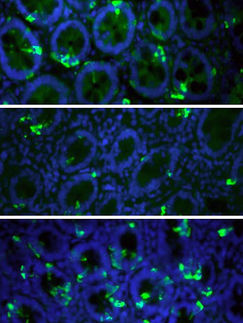Anti-inflammatory signal protein discovered
Researchers at the Swedish medical university Karolinska Institutet have discovered a protein that is crucial in mediating the anti-inflammatory actions of nuclear lipid receptors. The findings, published in genes & Development, link lipid metabolism and inflammation and open up new possibilities for developing treatments of metabolic diseases associated with inflammation, such as diabetes and atherosclerosis.
Nuclear receptors are regulatory proteins within the cell nucleus that can directly bind to a variety of hormones, metabolites and pharmaceuticals. Binding affects the activity of these proteins, causing them to switch genes on or off that in turn leads to increased or decreased production of the proteins that carry out diverse functions within the cell.
Numerous nuclear receptors are known as master regulators of lipid metabolism and homeostasis. Latest research indicates that these receptors also play important roles in the control of inflammation via mechanisms that remain to be clarified.
A team led by Professor Eckardt Treuter has now investigated the molecular mechanisms of how the nuclear lipid receptors LRH-1 and LXR inhibit inflammatory gene expression in liver during the so-called acute phase response. The study identified GPS2, a protein that directly interacts with receptors, as a central component of a sophisticated protein network – or ‘genomic positioning system’ – determining where and when these lipid receptors can function anti-inflammatory.
The identified pathway connects metabolism and inflammation and is therefore relevant for the understanding of metabolic diseases such as diabetes and atherosclerosis. The researchers suspect even broader roles of related pathways in different tissues linked to metabolic diseases and to cancers.
“We are now closer to understanding, at the molecular level, how dys-regulation of individual components of these pathways causes alterations in gene expression that contribute to the development of metabolic diseases linked to inflammation. This knowledge may open up novel pharmacological interventions. For example, drugs that stabilize receptor interactions with GPS2 could possibly trigger the anti-inflammatory pathway”, Eckardt Treuter says.
Original publication: Nicolas Venteclef, Tomas Jakobsson, Anna Ehrlund, Anastasios Damdimopoulos, Laura Mikkonen, Ewa Ellis, Lisa-Mari Nilsson, Paolo Parini, Olli A. Jänne, Jan-Åke Gustafsson, Knut R. Steffensen & Eckardt Treuter; "GPS2-dependent corepressor/SUMO pathways govern anti-inflammatory actions of LRH-1 and LXRb in the hepatic acute phase response"; Genes & Development 2010.
Topics
Organizations
Other news from the department science

Get the life science industry in your inbox
By submitting this form you agree that LUMITOS AG will send you the newsletter(s) selected above by email. Your data will not be passed on to third parties. Your data will be stored and processed in accordance with our data protection regulations. LUMITOS may contact you by email for the purpose of advertising or market and opinion surveys. You can revoke your consent at any time without giving reasons to LUMITOS AG, Ernst-Augustin-Str. 2, 12489 Berlin, Germany or by e-mail at revoke@lumitos.com with effect for the future. In addition, each email contains a link to unsubscribe from the corresponding newsletter.

















































